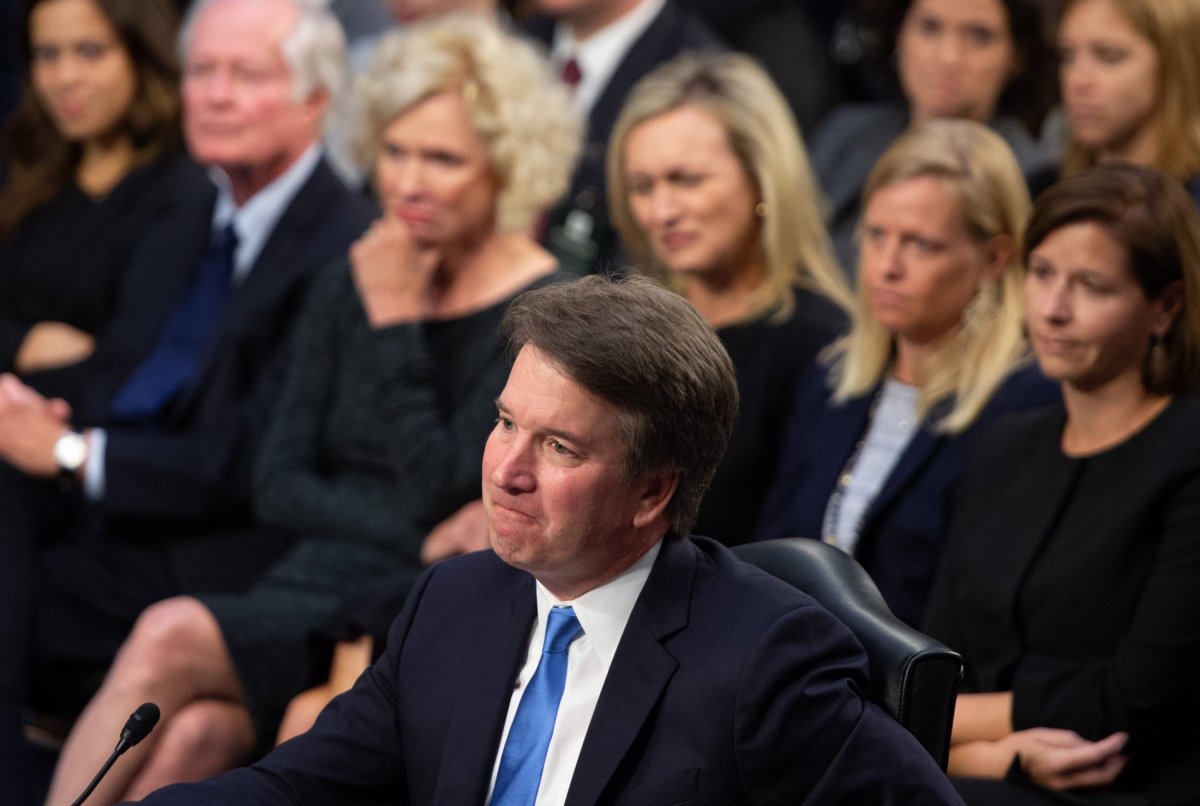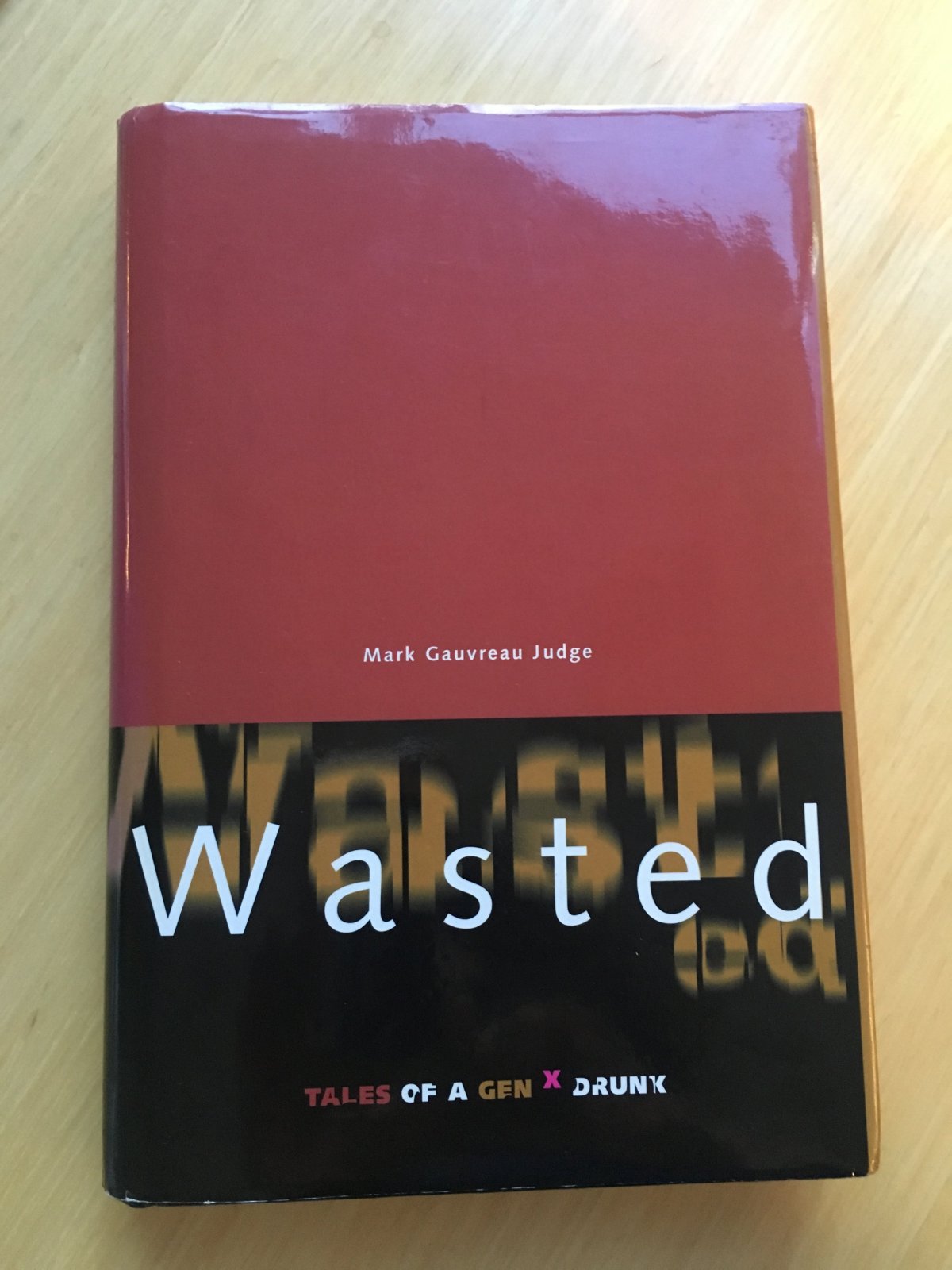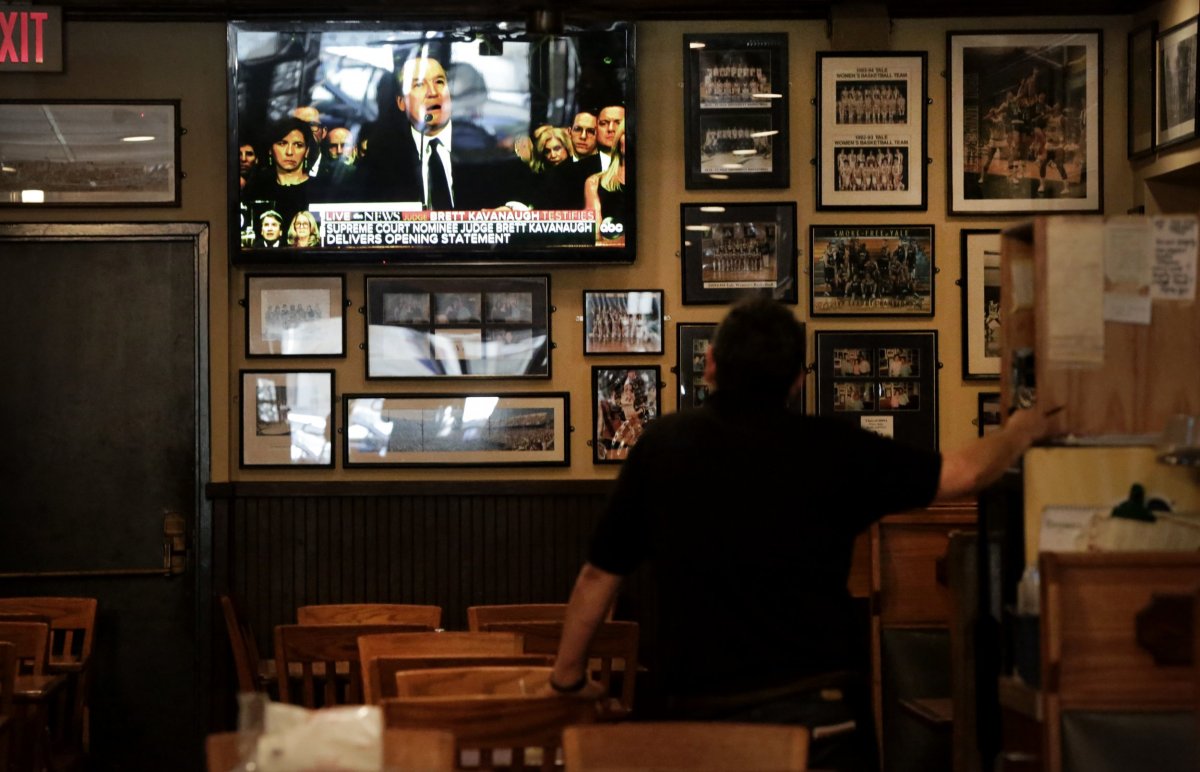The FBI has reportedly finished interviewing Mark Judge, the man named by Christine Blasey Ford as a witness to her alleged assault. The public might never know what he told agents, because Senate Majority Leader Mitch McConnell (R-KY) has said he will keep the FBI's final report confidential to Senators.
But Judge wrote a book about his booze-drenched high school years. I bought and read a copy of the memoir, Wasted: Tales of a Gen X Drunk. It provides numerous tantalizing clues to behavior and events that the FBI could have been interested in. And—speaking as a lawyer—I believe it contains corroborating evidence for not only Blasey Ford's account, but those of Kavanaugh's other accusers: women whose stories all refer to extreme inebriation by Kavanaugh, Judge, and their high school friends. The book vividly evokes a culture at Georgetown Prep of widespread denigration of women that so many D.C. Catholic school alumna have publicly recalled in recent weeks. It also raises the question of whether Kavanaugh was grounded or otherwise disciplined along with his friends in the last weeks of his senior year, and whether the FBI has asked for or seen his calendars for the entirety of his time at Georgetown Prep.
Wasted tells a colorful, vomit-flecked background story that diligent FBI agents could have used in their questioning this week. Judge's account of his & Kavanaugh's "shenanigans" while at Georgetown Prep is like watching Pretty in Pink's Steff on meth. The prep school boys appear soaked not just in alcohol, but in the currency of their own privilege, powerfully aware that their male classmates will never tell on them; that the cops will never treat them like average joes; and that their parents' wealth, connections and privilege will always shield them from personal accountability. They all act as though no real reckoning will ever come. Does Kavanaugh still believe we are living in that same world? Do our senators?
"Bart," the character who pukes and passes out after a hard night of drinking during Beach Week 1981, has been revealed as a nickname Brett Kavanaugh used himself among his Georgetown Prep buddies.
In addition, I propose that Kavanaugh may make a substantial appearance in his best friend's memoir in a pseudonymous role as "Shane," Judge's best friend. Bart/Shane appears throughout Wasted as Judge's co-conspirator in their extreme drinking, manufacturing fake IDs, proposing the Keg or Bust challenge at "Denny O'Neal's" (which may be a pseudonym for Donny Urgo Jr.) parents' party at the end of the summer, publishing the underground paper to brag about the Keg Club, targeting the houses of local all-girls' Catholic school "virgins," and, having been busted by "Father Carmen," being punished alongside Judge and other seniors with failure to graduate on time. Was Kavanaugh, like Shane, held back from graduation and instructed to do another day of their community service instead?
Is Shane in any way a representation of Kavanaugh, described as Judge's best friend?
All these questions ought to have been pursued by the FBI in interviews with Kavanaugh, Judge, and classmates this week. Was Kavanaugh one of the "twelve disciples"? Has the FBI requested his calendars for his entire time at Georgetown, including for his senior year, the time after the alleged sexual assault? Was he grounded by his parents or disciplined by the school in May of 1983? Did he attend graduation, or do community service? This should be researched in school records or interviews with several of his classmates.

As a whole, Judge's memoir of their years together at Georgetown Prep tends to undermine Kavanaugh's sworn testimony, as well as raising questions that I hope the FBI asked of Mark Judge, Brett Kavanaugh, and their classmates (many of whom are helpfully named in Kavanaugh's calendars for the summer months of 1982).
For example, based on the information in Judge's book, Kavanaugh appears to have perjured himself when he replied to prosecutor Rachel Mitchell's question, "Have you ever passed out from drinking?" by saying: "I — passed out would be — no, but I've gone to sleep, but — but I've never blacked out."
Here's a passage from the book:
"Do you know Bart O'Kavanaugh?"
"Yeah. He's around here somewhere."
"I heard he puked in someone's car the other night."
"Yeah. He passed out on his way back from a party."
Kavanaugh corroborates some of Judge's memories, as well. For example, Kavanaugh testified before the Senate that he was assigned to do community service at a "soup kitchen." So was Mark Judge: "For our community service job, Shane, Denny, and I were assigned to a soup kitchen in one of the poorest parts of DC. It was off of New York Avenue, a drug-infested neighborhood of broken-down row houses and empty lots."
Given Kavanaugh's testimony, the information in Wasted, and this week's interviews with Mark Judge, the FBI should already be investigating whether Kavanaugh served at the same soup kitchen, and inspecting any records at Georgetown and/or the soup kitchen itself.
Those aren't the only questions I would expect the FBI agents to ask witnesses this week, including Kavanaugh himself.
Kavanaugh and Judge both entered Georgetown Prep in 1979. Judge writes of being impressed by the widespread culture of drinking at Georgetown Prep: "Indeed, it soon became obvious that drinking was one of the major forms of recreation at Prep. On Monday morning the upperclassmen would return from the weekend with stories about keg parties, girls, and hours spent in bars in Georgetown....seniors would often go directly from class to a bar." In Wasted, virtually everyone appears to have known of, tolerated, and even sometimes encouraged excessive inebriation among even underage students. Judge writes, "drinking was part of the culture we had grown up in, and you had to be near death before anyone thought you had a problem."
Judge's writings contradict Kavanaugh's attempts in his testimony to give the impression that he and others drank legally while at Georgetown Prep. Judge makes it clear that to get around the known age limits, as juniors, Georgetown prep boys all had fake IDs made; that football players, who had "divine reverence" at Prep, organized "the best parties"; and that Prep kids' parents "didn't seem to care" what they did, whether it was Beach Week, hanging out at the bar or drinking at small and large house parties.
"For high schoolers from all over the Washington area, Georgetown was also party central...a bar on every block. There was only one minor problem: The drinking age in Washington was eighteen, and we were all seventeen. To get around this, we did what has become a rite of passage in modern America—we got fake IDs." Judge goes on to describe how "Shane and the rest of our classmates" became the fake ID artisans, cutting, pasting and copying fake documents for themselves and ultimately students at other area Catholic schools."
Did Kavanaugh make fake IDs with Judge? Did he ever have a fake ID of his own?
Judge writes that Georgetown Prep students used these fake IDs to drink to excess regularly at a local bar." On some Saturday nights the place looked like a party at beach week, with about twenty Prep guys, Mary and all her friends from St. Catherine's, and girls from other Catholic schools. For the most part, our parents didn't seem to care. For one thing, we lied, telling them that when we did go out it was only to someone's house and we would have 'one or two' at most. Second, most of our parents were drinkers, and they expected us to experiment a little."
School officials took notice—particularly the head of school—and tried to curb unlawful student drinking. To no avail. "At one school assembly, Prep's headmaster, Father Carmen, brought in a priest who was a recovering alcoholic to speak to the students...Throughout most of his talk, we all cracked jokes under our breath or didn't pay attention at all."
Besides the bars, Judge describes the parties in homes where parents were away, as drunken blowouts: "most of the patio furniture was in splinters. The mailbox had been plowed over"; "houses destroyed by rampaging hordes of drunken teenagers." He writes that "Shane" and "the other football players always organized the best parties...right in the center of action."

Judge describes events during the summer of 1982, during the period Blasey Ford alleges that Kavanaugh drunkenly attempted to rape her, that could corroborate her account. Judge recalls spending between four to seven nights a week drinking with "the gang" at the bar and at classmates' houses. Going a week without getting drunk was "unthinkable" that summer, which was almost without any parental supervision. "Because we were going to be seniors, our parents gave us tremendous slack. We were pretty much left alone to do what we wanted, when we wanted."
He also corroborates Blasey Ford's recollection that he worked at a local supermarket that summer while so "toxic from the alcohol" that he had stopped eating breakfast entirely. He describes blacking out at O'Rourke's and waking up "in the fetal position with saliva running out of the side of my mouth" in a bathroom a few blocks away in the Four Seasons Hotel. This behavior was so unremarkable that Shane and Denny didn't bat an eyelash when he disappeared.
Furthermore, Judge recounts one story of having sex with a drunken teenage girl that same summer under circumstances that call into question her ability to meaningfully consent to sex and his willingness to engage in such sexual activity. He heard a girl crying in his parents' bathroom. "'I passed out,' she moaned, rubbing her eyes. 'And now my friends have gone.'" Although himself "completely hammered," Judge drove her home, where she invited him in for a beer. He interpreted her invitation to mean " This girl wanted to have sex… .We went into her house, then into the kitchen. Laura opened the refrigerator and pulled out two beers. She had barely turned back around when I was on her. She moaned and put her arms around me….It was over in a matter of minutes….Laura mumbled. She was already half-asleep." He doesn't question whether perhaps she had simply passed out again.

This approach echoed Judge's take on Beach Week as a great chance for any guy to get "lucky." "Up until beach week it had all been minor league advances...Now I had an opportunity to make some headway. Most of the time everyone, including the girls, was drunk. If you could breathe and walk at the same time, you could hook up with someone."
Georgetown Prep knew partying had become out of control, and made efforts to discourage it. In an effort to "cure" the weekend binge drinking, the head of school decreed that seniors serve in a community outreach program early on Sunday mornings, and graduation would be contingent on participation.
When the new policy was announced at the "O'Neals'" party after football camp at the end of the summer, Judge and his friends were "outraged" and organized what Judge calls the 100 Keg Challenge to fight back against having their right to drink curbed in any way.
'You know why they're doing this, don't you?' Denny said. 'They know we go out and get tanked every weekend, and they want to make getting up on Sundays hell.'
'We have to do something,' I said. 'They can't get away with this our senior year.'
'What are we going to do?' Shane said, laughing. 'Drink a hundred kegs and brag about it?
No one laughed. For a second, no one even spoke.
'It's brilliant,' I said.
'Wait a minute,' Shane said. 'You can't actually be thinking of —'
'A hundred kegs,' I said. 'We're going to drink a hundred kegs, then brag about it.'
'How?' Shane asked.
Denny crumpled up the Saint and tossed it into the pool. 'A good first step would be to have our own paper. The Saint is nothing but a propaganda machine for Prep.'
I sat up. 'That's it. We could start our own newspaper. We could drink a hundred kegs, then brag about it in our own paper.'
They drank their way through 100 kegs during the school year and bragged about it in a school paper they created. The drinking took a toll. "Once I felt the first lilting rise of a buzz, I had to keep drinking until I could hardly walk. Many of the other guys were the same way; while some got sick after just a few beers, the hard-core drinkers could go all night, and often did. None of us found this disturbing in the least...To us, being members of what I called 'Alcoholics Unanimous' was as natural as a swan drifting into the water."
Kavanaugh was the Keg Club Treasurer: did he purchase all 100 kegs? Did he collect funds to do so from other students? Did these kegs serve underage students?
By March of their senior year, according to Judge, the friends were up to 80 kegs and some Georgetown boys were engaging in routine vandalism of the homes of D.C.-area "virgins" from Catholic schools: "We only do students from Washington's finer virgin vaults and only strike when she and her family are away..… all of them were...friends with guys who went to Prep." The boys put together "the official journal of the 100-keg quest and everything that happened on the way" in Denny's basement, and it also "championed… a rash of vandalism directed at the houses of Catholic girls. Several girls from Stone Ridge, Holy Child, Visitation, and other all-girls Catholic schools had gone on vacation with their parents only to come back and find their houses...so completely draped with toilet paper and shaving cream that you couldn't see a blade of grass or a window pane."
In May, an incident of vandalism by the Georgetown boys triggered a crackdown by the school (but not their parents). The boys' ringleader was caught that night (and let go without consequence) by police; school administrators "held back" 12 boys, including "Shane" and Judge. The boys were under orders to complete their school work at community college over the summer and to do community service on graduation day—instead of graduating.
Did Kavanaugh graduate on time? Was he one of the twelve who were held back?
Judge writes that he and his pals were furious. "We had all put four years and thousands of dollars into Prep, and ...they weren't going to let us graduate on time."
Judge writes that Georgetown parents took their kids' side. "Other parents whose sons were not graduating—in the final tally there were about twelve of us—were calling to compare notes with my parents. When my parents found out how many had gotten busted, they eased up considerably."
None of this deterred Judge and his friends: "there was still one piece of unfinished business. The keg count was at ninety-eight. Despite all the trouble we were in, we couldn't end the year without reaching the magic number."
The Saturday night before graduation, says the memoir, the friends gathered in the parking lot of the National Cathedral. "Modeled after the Notre Dame in Paris, its gray gothic towers reach toward heaven and take up a block the size of a football field. It has a large, dark parking lot in the back, and we had rented a van and put the two kegs in the back," Judge wrote.
"At the top of the parking lot was a grassy hill with a large Celtic cross in the center. From there you had a panoramic view of the glittering lights of Capitol Hill. Shane, Denny, and I sat at the base of the cross, enjoying the view and getting drunk.
On graduation day, "Denny, Shane, and I went to the soup kitchen to work."
Judge was shielded from testifying under oath by the Republican majority in the Senate Judiciary Committee. If the FBI officials were diligent, they read Wasted, as I did, and they sought answers to the key questions.
Erin Conroy is a graduate of Yale Law School; her current research projects include a proposal for the constitutional resolution of current political crises.
The opinions expressed are the author's own.
Correction, 10/3, 8:00 p.m.: Kavanaugh's calendar covered the end of his junior year at Georgetown Prep, not his senior year as originally written.
Uncommon Knowledge
Newsweek is committed to challenging conventional wisdom and finding connections in the search for common ground.
Newsweek is committed to challenging conventional wisdom and finding connections in the search for common ground.
About the writer
To read how Newsweek uses AI as a newsroom tool, Click here.








